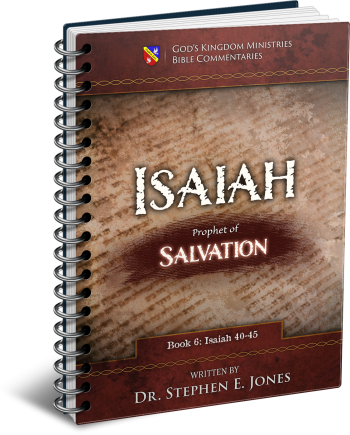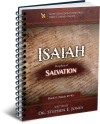Latest Posts
View the latest posts in an easy-to-read list format, with filtering options.

Isaiah is the prophet of Salvation. He is also known as the truly "Universalist" prophet, by which is meant that He makes it clear that salvation is extended equally to all nations and not just to Israel. He lived to see the fall of Israel and the deportation of the Israelites to Assyria, and he prophesied of their "return" to God (through repentance). He is truly a "major prophet" whose prophecies greatly influenced the Apostle Paul in the New Testament.
Category - Bible Commentaries

Having laid the foundations of the sovereignty and omniscience of the great Creator—Who is the beginning and the end—and of His New Covenant promise to save and restore Israel, the prophet continues in Isaiah 41 by declaring that this same God is Israel’s Redeemer. Having brought judgment upon Israel, God addresses them with promises of deliverance, based purely upon His New Covenant power and ability to turn the hearts of the people and to save them.
Isaiah 41:1 begins by gathering the nations for a divine court case,
1 Coastlands, listen to Me in silence, and let the people gain new strength; let them come forward, then let them speak; let us come together for judgment.
The Hebrew word iy, translated “coastlands,” refers to maritime lands, shores, coasts, or islands, implying distant places where one may travel by ship. The KJV renders it “islands.” Though all far-off nations are being summoned for this court case, the issue is specifically about the destiny of Israel. In other words, the time has come to settle the international disputes.
Many commentators fail to distinguish between Israel and Judah, and so they apply this prophecy to the Jews or to the present Jewish state which calls itself Israel. The prophet himself seems to presume the repair of the breach between Israel and Judah, which was to occur in the latter days. Hence, his use of the term Israel was no longer to distinguish it from Judah but to present a restored nation of all the tribes.
Isaiah 41:2-4 identifies the Judge in this case, who is summoning the nations to His court:
2 “Who has aroused one from the east, whom He calls in righteousness to His feet? He delivers up nations before him and subdues kings. He makes them like dust with his sword, as the wind driven chaff with his bow. 3 He pursues them, passing on in safety, by a way he had not been traversing with his feet. 4 Who has performed and accomplished it, calling forth the generations from the beginning? ‘I, the Lord, am the first, and with the last. I am He’.”
The fact that God “has aroused one from the east, whom He calls in righteousness” seems to refer to Cyrus, the king of Persia, who is described later in chapters 44 and 45. Cyrus, in turn, was bigger than himself, for he was a type of Christ in this latter-day deliverance. Though Cyrus himself delivered only Judah in his day, the Messiah delivers all Israel in the latter days (Isaiah 45:25; Rom. 11:26).
Just as God delivered up nations before Cyrus and used him to subdue kings (including Belshazzar, king of Babylon), so also will God deliver up the end-time nations to Christ, the true Messiah. The shorter-term prophecy was to be fulfilled when God sold Babylon (the head of gold) into the hands of the Medes and Persians about a century and a half after Isaiah’s time. But the prophecy is about divine judgment upon the entire statue when its allotted time to rule the nations had expired.
This dual fulfillment is suggested also by the statement that God is “the first” and “the last,” that is, the beginning and the end (alef-tav). In that sense, the alef is the beginning of judgment when Cyrus conquered Babylon and brought deliverance to Judah; the tav is the end-time judgment when Christ conquers Mystery Babylon to bring deliverance to Israel as a whole.
It is clear from verse 4 that the One gathering the nations for the court case is the God of heaven.
Isaiah 41:5-7 says,
5 The coastlands have seen and are afraid; the ends of the earth tremble; they have drawn near and have come. 6 Each one helps his neighbor and says to his brother, “Be strong!” 7 So the craftsman encourages the smelter, and he who smooths metal with the hammer encourages him who beats the anvil, saying of the soldering, “It is good”; and he fastens it with nails, so that it will not totter.
In metaphorical language, the nations are seen preparing their defense in the divine court. They are “afraid,” yet they encourage each other in the construction of their idols, which they believe will show them the path of justification, whereby they may win the court case.
On the other side stands Israel who has been assigned the Comforter as their defense. So we read in Isaiah 41:8-10,
8 But you, Israel, My servant, Jacob whom I have chosen, descendant of Abraham, My friend, 9 you whom I have taken from the ends of the earth, and called from its remotest parts and said to you, “You are My servant, I have chosen you and not rejected you. 10 Do not fear, for I am with you; do not anxiously look about you, for I am your God. I will strengthen you, surely I will help you, surely I will uphold you with My righteous hand.”
Here it is clear that when God addressed the “coastlands” in verse 1, He was addressing Israel, “whom I have taken from the ends of the earth.” Such terminology hardly described Judah, which came only from Babylon. Babylon was some distance away, but it was not “the ends of the earth.”
Those who assume that the Jewish state is the Israel of Isaiah’s prophecy will say that this refers to the Jews who have been regathered in the old land in the past century. However, the Jews have only recently claimed to be the biblical Israelites. Throughout their history, they have prayed in their synagogues to be reunited with the Israelites, thereby confessing that they are not the Israelites in Isaiah’s prophecies.
The physical Israelites were taken to Assyria, not Babylon, and after Assyria fell in 612-607 B.C., many of those Israelites began to migrate north through the Caucasus Mountains and into Europe. Many were called Khumri (or Ghomri or Gimirra), named for King Omri of Israel. Others were known as Saka, Sacae, or Saxons, named after the House of Isaac (Amos 7:16).
The point is that they lost their name Israel and certainly were never known as Jews. Historians eventually settled on the name Caucasian, because so many of them had immigrated north into Europe, crossing through the Caucasus Mountains that were located between the Black Sea and the Caspian Sea.
All of these migrations of Israel occurred long after Isaiah’s time. In fact, Judah itself had not yet gone into captivity to Babylon. The prophet’s long-term view of the regathering of Israel was a revelation that he himself hardly understood. He knew clearly that the lost sheep of the House of Israel would be regathered in the end, and he knew that the controversy of Zion would be settled (Isaiah 34:8, KJV). However, he had only a dim understanding of how this would happen.
As we will see, the prophet also knew that the regathering and restoration of Israel would include Judah and many “foreigners” with them (Isaiah 56:6, 8). Hence, Israel was not a racial term but a national term. This was so from the beginning, for when Israel was first transformed from a collection of clans to a nation under Moses, many foreigners were included (Exodus 12:38).
Isaiah tells us that in the second redemption of Israel, many foreigners will again be included. They, along with the genealogical Israelites, are required to come under the New Covenant in submission to the Mediator of the New Covenant, Jesus Christ. All who do so are treated equally, as Jesus often demonstrated. Peter learned this in Acts 10:34-36, and Paul explains it further in Rom. 3:22, Eph. 2:11, 15, and in many other passages.
The Holy Spirit—that is, the Comforter—was promised to Israel, but was shared freely with all ethnic groups. Peter was taken by surprise when the Holy Spirit came upon the Romans in the house of Cornelius. He should have known from Deut. 16:10, 11 that the “feast of weeks” (i.e., Pentecost) was to be kept by both Israelites and foreigners alike.
We must keep this in mind when studying the prophecies of Isaiah, so that we may avoid the narrow definitions of Israel that many hold today. When the prophet calls Israel “My servant, Jacob whom I have chosen, descendant of Abraham,” (Isaiah 41:8) he was not excluding foreigners who had become Israelites by attaching themselves to the Covenant. Faith alone creates the children of Abraham (Gal. 3:7).
The prophet tells Israel not to be afraid when they are summoned to the divine court. The Comforter was to give them counsel so that they could win their case. The Israelites had been exiled for idolatry and were just as guilty as the other nations being summoned; however, the Holy Spirit was their Counsellor, showing them how to be justified in their “return” to God.
When we follow the leading of the Spirit, we always win our court case against the Accuser (Prosecuting Attorney, the devil). Even when we are guilty, the law shows how to be found not guilty (grace). The law of sacrifice points to the sacrifice of Christ, the Lamb of God who takes away the sin of the world.
The great Comforter shows us how to plead our case, saying, “we confess that our sin is real, but the penalty has already been paid in full by Jesus Christ.”
The Judge then acknowledges that it is so, and we are then justified by faith in His blood.
Israel’s accusers are thus shamed for their failure to know the law and its provision of grace through sacrifice. Isaiah 41:11-14 says,
11 “Behold, all those who are angered at you will be shamed and dishonored. Those who contend with you will be as nothing and will perish. 12 You will seek those who quarrel with you, but you will not find them. Those who war with you will be as nothing and non-existent. 13 For I am the Lord your God, who upholds your right hand, who says to you, ‘Do not fear, I will help you’. 14 Do not fear, you worm, Jacob, you men of Israel; I will help you,” declares the Lord, “and your Redeemer is the Holy One of Israel.”
In this international court case, Israel is justified (by faith in the blood of the Lamb). The ungodly nations lose their case against Israel because of the counsel of the Comforter who helps Israel. Though Israel is as weak as a “worm,” they receive help from God Himself through the Comforter.
So Paul tells us in Rom. 8:33-37,
33 Who will bring a charge against God’s elect? God is the One who justifies; 34 who is the one who condemns? Christ Jesus is He who died, yes, rather who was raised, who is at the right hand of God, who also intercedes for us… 37 But in all these things, we overwhelmingly conquer through Him who loved us.